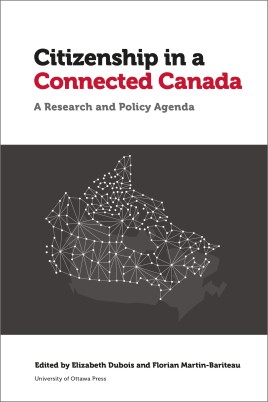Elizabeth Dubois and Florian Martin-Bariteau have put together a great collection of chapters focused on Canadian citizenship in the digital age in their new edited collection, Citizenship in a Connected Canada. I contributed a chapter that identifies gaps in research and policy on public data governance in Canada. The abstract is below, and the entire book is available for purchase or as an open access download here.
Abstract:
Picking up on a global orthodoxy calling for digital government transformation, governments across Canada are now introducing ambitious service reforms and broader changes to the organization and culture of public service institutions. These reforms are primarily justified on the grounds that they are necessary if governments wish to meet the expectations of citizens accustomed to the innovative digital service offerings of the private sector. Yet with digital transformation agendas come notable changes to the ways that public sector data is collected, applied, and shared across the state and amongst private firms. These data governance reforms may prove unacceptable to citizens where they lead to privacy breaches, betray principles of equity, transparency and procedural fairness, and loosen democratic controls over public spaces and services. This chapter presents three cases that illustrate the data governance dilemmas accompanying contemporary digital government reforms. The chapter next outlines a research and policy agenda that will illuminate and help resolve these dilemmas moving forward, with a view to ensuring that digital era public management reforms bolster, rather than erode, Canadians’ already precarious levels of trust in government.

Citation: Clarke, A. 2020. “Data Governance: The Next Frontier of Digital Government Research and Practice” in Citizenship in a Connected Canada: A Research and Policy Agenda for Digital Citizenship. Elizabeth Dubois and Florian Martin-Bariteau, eds. Ottawa: University of Ottawa Press, pp. 97-117.